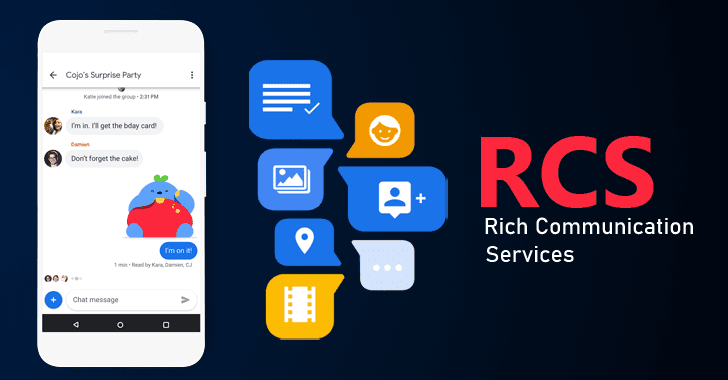Mobile carriers in the United States will finally offer a universal cross-carrier communication standard for the next-generation RCS messaging service that is meant to replace SMS and has the potential to change the way consumers interact with brands for years to come.
All major United States mobile phone carriers, including AT&T, Verizon, T-Mobile, and Sprint, have joined forces to launch a new initiative that will replace SMS with RCS mobile messaging standard.
What’s more? The initiative is also working with its carrier ownership group and other companies to develop and deploy the new RCS standard in a new text messaging app for Android phones that is expected to be launched in 2020.
The goal of this joint venture, dubbed the Cross Carrier Messaging Initiative (CCMI), is to deliver the GSMA’s Rich Communications Service (RCS) industry standard to consumers and businesses on each of the four carriers, both in the United States and globally.
“Efforts like CCMI help move the entire industry forward so we can give customers more of what they want and roll out new messaging capabilities that work the same across providers and even across countries,” said T-Mobile CEO John Legere.
Besides this, the initiative also wants to provide users with the ability to communicate with businesses, so they can “chat with their favorite brands, order rideshare, pay bills or schedule appointments, and more.”
Why RCS Hasn’t Killed SMS Yet?
Although the RCS standard was developed over a decade ago, it has never been adopted widely due to complicated mobile carrier and phone maker politics; for example, Apple has no interest in RCS because it is already offering more than that through iMessages.
Even a few carriers and services who are offering the new messaging standard have implemented their non-universal specifications of RCS standard, which limits the exchange of RSC-based messages only to the subscribers of their networks.
Earlier this year, Google also independently released RCS messaging for Android smartphones in two countries, the United Kingdom and France, instead of waiting for cellphone carriers to roll it out.
Not End-to-End Encrypted, But RCS Offers Some Integrity
Unlike ancient SMS technology, RCS-based enhanced text message service supports high-resolution photo sharing, location sharing, group messaging, animated stickers, read receipts, and some other features like Apple iMessage, to significantly improve messaging functionality that comes installed on phones by default.
However, unlike iMessage, Signal, and WhatsApp, RCS-based messages are not end-to-end encrypted.
Still, it contains message verification and brand certification mechanisms to ensure users interact with legitimate brands, protecting them from fraudulent accounts, impersonators, or phishing attempts.
Besides this, SMS communicates over SMPP or insecure SS7 protocols, whereas RCS traffic between the device and the network can be protected using SIP over TLS encryption.
Since the CCMI project has not yet fully developed its RCS-based messaging standard, it’s not clear, at this moment, if the major U.S. carriers would come up with something that will ensure users’ privacy from government surveillance.
However, the announcement does say that it will “enable an enhanced experience to privately send individual or group chats across carriers with high-quality pictures and videos,” the press release says.
“The CCMI will bring a consistent, engaging experience that makes it easy for consumers and businesses to interact in an environment they can trust. As we have seen in Asia, messaging is poised to become the next significant digital platform. CCMI will make it easy for consumers to navigate their lives from a smartphone,” said Sprint CEO Michel Combes.
“At Verizon, our customers depend on reliable text messaging to easily connect them to the people they care about most. Yet, we can deliver even more working together as an industry. CCMI will create the foundation for an innovative digital platform that not only connects consumers with friends and family but also offers a seamless experience for consumers to connect with businesses in a compelling and trusted environment,” said Verizon Consumer Group CEO Ronan Dunne.
Though all four carriers promise to bring the new RCS messaging to Android by next year, it will not be available to all Android users at the same time, as users might also need to have a smartphone that supports the standard.













![Hotstar Premium Cookies 2019 [*100% Working & Daily Updated*] Hotstar Premium Cookies 2019 [*100% Working & Daily Updated*]](https://tahav.com/wp-content/uploads/2019/11/Hotstar-Premium-Cookies-Free-100x70.jpg)



